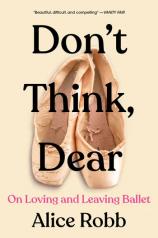Don't Think, Dear: On Loving and Leaving Ballet
Review
Don't Think, Dear: On Loving and Leaving Ballet
Alice Robb was a student at the School of American Ballet in New York City during a period of relative calm. When she started taking lessons there (the feeder school for the New York City Ballet) in 2001, its founder, George Balanchine, had been dead for nearly 20 years. Still, the students and faculty would dress up and sing "Happy Birthday" to him, and many of the teachers considered themselves his disciples.
"DON'T THINK, DEAR will appeal to balletomanes and recovering dance students alike. Just as Robb does near the end of the book, readers will come away hopeful that perhaps this most rigid of art forms might finally become more flexible."
But what really characterized the SAB and the NYCB, Robb contends, were darker remnants of Balanchine's approach, philosophy and methods. This included the essentially unattainable aesthetic ideal for his female dancers --- an insistence on an almost impossibly long, lean body, a small head, and feet with exaggerated arches. Anyone who has read much fiction or nonfiction about ballet (or watched films like Black Swan) is no stranger to the extreme measures that serious dancers --- many of them young adolescents --- take as they strive for this aesthetic. But Robb goes farther than most, connecting their bodies not only to the pursuit for thinness but to their extreme tolerance for pain and their nearly supernatural level of spatial awareness.
Robb also writes at length (and, for those of us who grew up idolizing NYCB ballerinas, with plenty of gossipy detail) about Balanchine's muses. Maria Tallchief, Suzanne Farrell and Gelsey Kirkland were the principal dancers who inspired his choreography, in many cases sharing his bed, and became household names. Robb chronicles the power dynamics at play in these women's lives and careers, and how those dynamics continued to shape expectations for ballet students like herself.
The framing device for Robb's book is a photograph of herself and her SAB classmates, only a handful of whom went on to careers in dance. As Robb considers factors such as body image, injuries and romantic relationships swirling around the life of a competitive dancer, she checks in on those girls, now in their early 30s, to hear how they reflect on their training and discover how they've emerged from it. In some ways, DON'T THINK, DEAR resembles an addiction memoir. Some of Robb's subjects express relief that they got out before they could sustain too much damage. Others have done everything they could to stay in that world. Most agree that if they ever have daughters of their own, they'll discourage them from pursuing ballet.
As for Robb herself, she has found joy in a profession --- writing --- that doesn't care if you've put on a pound or two or if your hair has fallen out of its bun. And she's taking tiny steps --- a bourrée, if you will --- toward approaching ballet as something that might be freeing and even fun. DON'T THINK, DEAR will appeal to balletomanes and recovering dance students alike. Just as Robb does near the end of the book, readers will come away hopeful that perhaps this most rigid of art forms might finally become more flexible.
Reviewed by Norah Piehl on March 3, 2023
Don't Think, Dear: On Loving and Leaving Ballet
- Publication Date: February 15, 2025
- Genres: Memoir, Nonfiction
- Paperback: 304 pages
- Publisher: Mariner Books
- ISBN-10: 0063352451
- ISBN-13: 9780063352452




